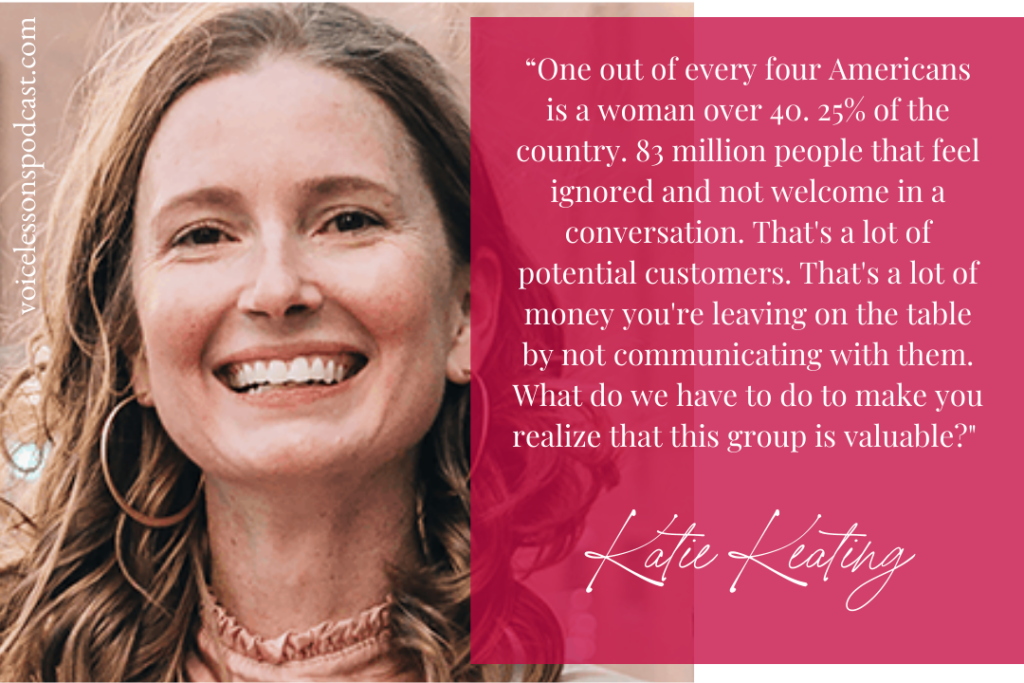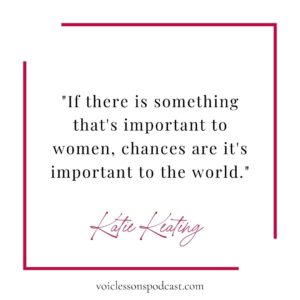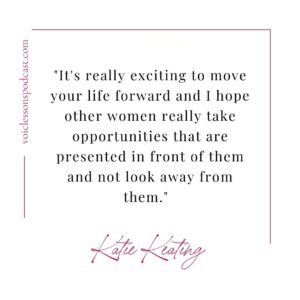A Lesson On Doing It Anyway with Katie Keating
One in four Americans is a woman over 40. Katie Keating co-founded Fancy Inc., a 100% women-owned, operated, and focused advertising agency to help advertisers speak to them. In this lesson on “doing it anyway,” she talks about her mission, the 3%, and why women need to harness the power they possess as consumers to change the culture.
One in four Americans is a woman over 40. Katie Keating co-founded Fancy Inc., a 100% women-owned, operated, and focused advertising agency to help advertisers speak to them. In this lesson on “doing it anyway,” she talks about her mission, the 3%, and why women need to harness the power they possess as consumers to change the culture.

Katie came to New York for a New Year’s Eve party and never left. As Co-Founder/Co-CCO of Fancy LLC, she sees inspiration around every corner. She loves the excitement born out of big ideas and brings that enthusiasm to every account. In 2011, she co-founded the 100% women-owned, operated, and focused advertising agency, Fancy. With a mission to elevate what’s important to women, Fancy breaks taboos around aging, pleasure, sexual health, bodily functions, mental health, even finance and moves the cultural needle forward with every assignment. Highlights include everything from celebrating the many enviable aspects of aging for the first campaign for Hair Biology, to traveling to Haiti with 6 women to shoot a video about childbirth in the poorest country in the western hemisphere, to normalizing the conversation around women and sex toys for adult retail chain Lion’s Den.
Prior to founding Fancy, Katie worked her way in, up, and around the big-name, blue-chip agency world: Saatchi, Publicis, JWT, Grey, Wells Rich Greene, and even a stint on the client-side at Clinique. Campaigns for Olay, Tide, Garnier, Delta Air Lines, Pantene, Clairol and more all bear her hallmark copywriting style of thoughtful words delivered with a wink.
Katie received a BA in Psychology from Kenyon College, and a copywriting degree from Portfolio Center. She continues to be fascinated by what makes people tick, especially her husband and two teenagers in NYC.
LISTEN: APPLE PODCASTS | STITCHER | SPOTIFY
TOPICS DISCUSSED IN THIS EPISODE:
- Katie’s journey to forming Fancy.
- At the time Katie got into advertising, only 3% of Creative Directors were women.
- Why Katie decided to quit her well-paying agency job to gain more control over her career.
- The hardest thing about starting your own agency, according to Katie.
- Why women are faced with “aging out” of their careers as they get older.
- Is the female competition still a thing?
- The article Katie wrote about women over 40 that went viral, and the response it received.
- How women can harness their purchasing power to affect the kind of change that they want to see in the world.
- 80% of women make the household purchasing decisions.
- Women’s resistance when talking about money and finances.
- How do you encourage brands to take the leap and have a conversation with women in a more inclusive way?
#LESSONUP
(2:35) I am one of the few people who ended up in the creative department of an ad agency because I wanted to be there. So lots of people just end up there because it’s a way to pay bills while you’re trying to write the great American novel, or you want to be a painter, you also need to eat. And so you’re an art director, something like that. But I, from a young age really knew even before I knew that the job was called copywriter or anything like that, I knew I wanted to be in an environment where I was getting paid to make ideas, to think up stuff, to approach the assignment from a different direction.
(4:30) Just about the same time that the 3% conference at 3% movement really, as it’s become, came out and said that . And I couldn’t believe it. I was just sort of gobsmacked at that statistic. And I had a good friend who had been one of my art director partners in the past at a couple of different jobs. And she and I were talking about it. And so we had always talked about, oh, if we had an agency, we do things differently. If we were in charge, things would be so much better. And because we were both the breadwinners for our families, we couldn’t just quit and start an agency. But when we saw this statistic that really made us feel like, wow, maybe we really should.
(12:11) The thing is that I’ve really learned, even though there are a million hard things about starting an agency is that other people want you to succeed. And I think that is one of the things that was surprising to me. I think a lot of women will be surprised by that because there’s that competitive thread in our culture, definitely in the masculine paradigm, but also that women are catty and they don’t want you to succeed and everybody wants you to fail.
(16:40) My agency has been really interested in women over 40 in terms of both the way they’re been portrayed in advertising, as well as their inclusion within advertising agencies. Sometimes I think it takes one to know one. It’s no secret. And we did this big survey among women over 40 asking them what they thought about advertising and marketing and how they felt they were portrayed and stuff like that. And the overwhelming majority were really irate that they were left out of the conversation that they weren’t targeted, that they felt they didn’t matter, that they were kicked aside for the next new shiny model. We’ve been interested in that for a long time. And I had been writing about it for a long time. And I came across this statistic. That is the one you quoted that one out of every four Americans is a woman over 40. And I was blown away by that fact. And obviously it’s not one out of four are exactly 40 it goes up until a hundred plus, but that’s still a huge amount of women that have people 25% of the country, 83 million people that feel ignored and not welcome in a conversation. And just purely as a business target or we think for our brands that we work with, that’s a lot of potential customers. That’s a lot of money you’re leaving on the table by not communicating with them. Like what do we have to do to make you realize that this group is valuable?
(16:40) Another trend that we’re seeing in women is that they also stand to inherit several trillion dollars of the world’s wealth. I think it’s a real opportunity for women themselves to start to stand up and demand and move culture when they move dollars. I also don’t think we have to make it necessarily only their responsibility to make things better of course. But I do think that it’s a pretty great opportunity to be able to say, Nope, I’m not giving my money to you brand because I don’t feel like you’re helping me or you charity. That’s not going down the road that I think you should, in terms of helping women in a positive way, or you, somebody else, you really using those dollars to affect the kind of change that they want to and not about where, just about where not to spend them, but where can we help elevate women in a more substantial way? Like how can be as women be buying other women-owned products and things from other women-owned businesses? How can we support retailers that have programs that promote women-owned products and women-owned businesses? How can regular just like an average woman make a big difference? And it’s often with the way she spends her money. She controls 80% of spent household spending decisions.
(20:58) I’m really passionate about women and finance because I really do think that we’re not going to be able to really be equal and gain the kind of seats at the table and the decision-making equality that we deserve until we have financial equality and I don’t think we’re going to have that until we can really talk about it with each other in a very open way.
(23:40) I think there is, I don’t know if that’s always the way everybody would, would label that type of leadership, but I do think that women lead differently. I feel like that’s probably been fairly well-documented. I don’t think that they often have the opportunities to lead, to exercise their feminine leadership that others that men might have. I think that it’s changed over time too, because 30 years ago when there were only a couple of spots for women at the top if you were one of those lucky women, you were going to do what you had to hold on to that spot and to be one of the guys and emulate what you saw around you. One of the things that’s so nice about what’s happening now, especially with all the startups that are being started by women, is that there are a lot of examples now out in the world for women to look at, to see how to lead. So I Women are, are encouraging to other women to say, here’s what worked for me. There’s so many groups and organizations where women are really happy to share their knowledge and not be competitive and, and have a rising tide lifts, all boats, attitude. It’s so it’s so refreshing and it’s really just really great to be a part of that wave.
(26:05) I do think that the conversation changes when women are in the room. And I think that it becomes better for the men too. I don’t think it’s really just about making it better for women, because it’s only going to be better for women. It will be better for everybody. If it’s important, if there is something that’s important to women, chances are it’s important to the world. I think that’s a big part of it is really having a diversified team of people that are going to be able to begin the conversations internally so that the team is prepared to have them externally..
RESOURCES/FACTS:
The CEO who gave his employees a minimum wage of $ 70,000 says his company’s revenue tripled
New Special K ad urges women to stop the ‘fat talk’
1 in 4 Americans is a woman over 40. So why do so many feel ignored?
Women and the Great Wealth Transfer
Victoria’s Secret Swaps Angels for ‘What Women Want.’ Will They Buy It?
Geena Davis, The Reel Truth: Women Aren’t Seen or Heard
From Facebook to Apple: 6 Unique, Scalable Culture Traits of Top Big Tech Companies
ENJOYING THE SHOW?
- Don’t miss an episode, follow on Spotify and subscribe via Apple Podcasts, Stitcher, or RSS.
- Leave us a review in Apple Podcasts.
PIN IT:


A Lesson On Doing it Anyway with Katie Keating
VIEW THE COMMENTS